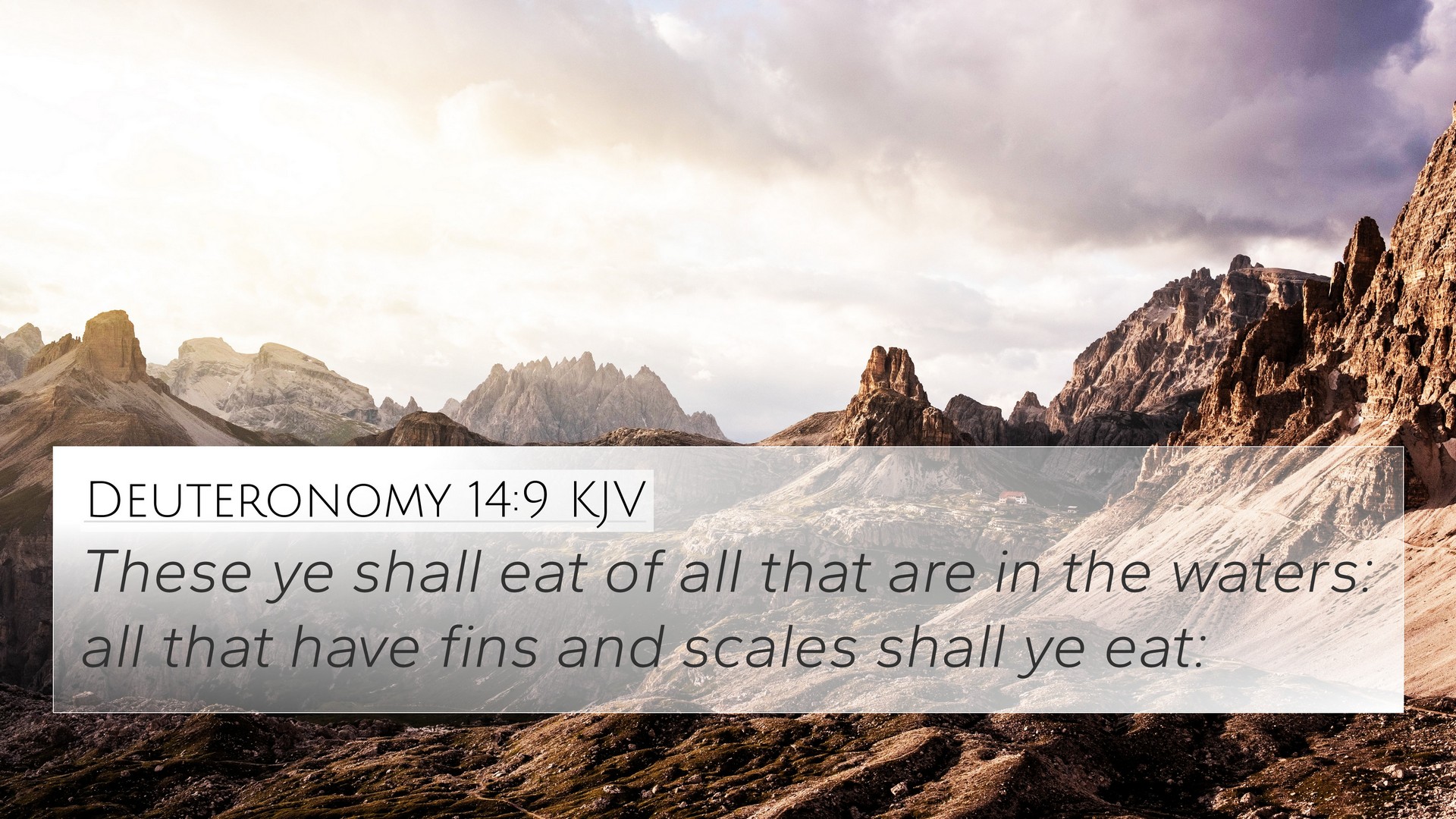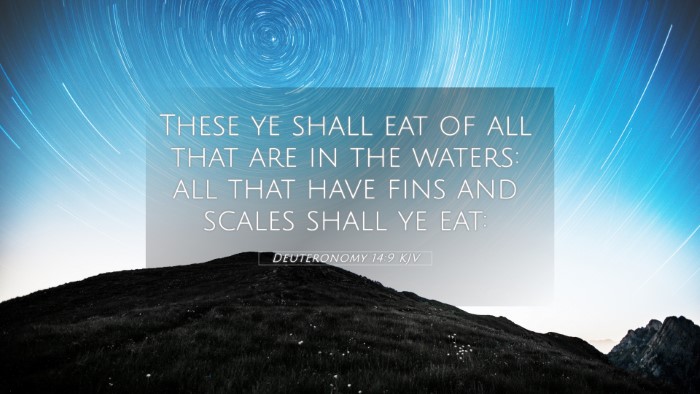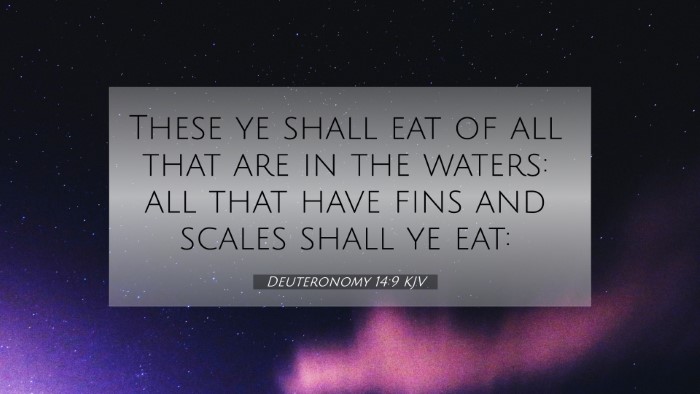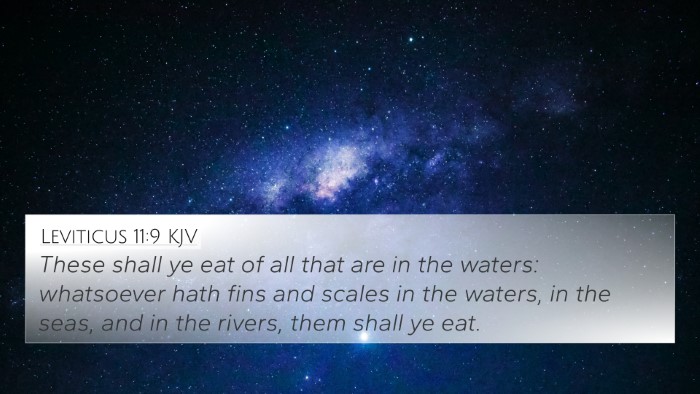Understanding Deuteronomy 14:9
Bible Verse: Deuteronomy 14:9 - "These you may eat of all that are in the waters: all that have fins and scales shall ye eat."
Overview
Deuteronomy 14:9 is part of the Mosaic Law specifying dietary regulations for the Israelites regarding clean and unclean animals, particularly concerning creatures that dwell in water. This verse delineates which aquatic creatures are permissible for consumption, establishing criteria based on the presence of fins and scales.
Commentary Insights
This verse has been interpreted through various public domain commentaries, providing rich insights into its meaning and implications:
Matthew Henry's Commentary
Matthew Henry emphasizes the importance of divine commands in dietary laws, illustrating God's concern for His people's holiness and obedience. He notes that the specifications of fins and scales are not arbitrary; they symbolize purity and separation from the profane. This adherence to dietary laws is seen as a way to maintain spiritual and communal identity among the Israelites.
Albert Barnes' Notes on the Bible
Albert Barnes highlights that the distinction between clean and unclean animals serves a dual purpose: it underscores the Israelites' distinctiveness as God’s chosen people and foreshadows spiritual truths regarding purity. Barnes also references that these dietary practices have implications for the spiritual health of the community, drawing a correlation between physical and spiritual cleanliness.
Adam Clarke's Commentary
Adam Clarke provides practical observations about the nutritional benefits of fish with fins and scales, suggesting that these creatures are not only spiritually beneficial but also physically advantageous. Clarke argues that these laws promote a healthier lifestyle and reflect God's wisdom in the regulation of human conduct.
Cross-References
This verse is interconnected with various scriptures that provide further understanding:
- Leviticus 11:9-12: Details similar dietary restrictions concerning aquatic life.
- Isaiah 66:17: Discusses the fate of those who eat unclean animals.
- Acts 10:12-15: Peter receives a vision that challenges the understanding of clean and unclean.
- Matthew 15:17-20: Jesus teaches that what enters the mouth does not defile a person, emphasizing internal purity.
- 1 Timothy 4:4-5: Paul states that all foods are created by God and are good when received with thanksgiving.
- Psalm 104:25-26: Praise for God’s creation of sea creatures, celebrating the diversity of life.
- 1 Corinthians 10:31: Encouragement to do everything for the glory of God, which extends to dietary choices.
Thematic Connections
The themes present in Deuteronomy 14:9 connect to broader biblical ideas:
- Spiritual Purity: The emphasis on cleanliness reflects a deeper call to spiritual integrity.
- Obedience to Divine Law: Following dietary restrictions symbolizes one's commitment to God and His commandments.
- Separation from Gentile Practices: The Israelites are called to be distinct from surrounding nations in their eating habits and rules.
Relevance Today
The dietary laws in Deuteronomy 14:9 prompt discussions on health, spirituality, and obedience among contemporary readers. Many seek to apply these ancient principles in modern contexts, emphasizing the balance between the letter of the law and the spirit behind it.
Tools for Cross-Referencing Bible Verses
Understanding Deuteronomy 14:9 through cross-referencing allows readers to explore its full context and implications. Here are some tools and methods for effective Bible cross-referencing:
- Bible Concordance: A helpful resource for finding relevant verses based on keywords.
- Bible Cross-Reference Guide: Guides that offer related scriptures and suggest themes.
- Cross-Reference Bible Study: A method that involves studying verses in relation to one another to gain deeper insights.
- Cross-Referencing Bible Study Methods: Approaches that emphasize thematic studies across different books of the Bible.
Conclusion
Deuteronomy 14:9 encourages both personal reflection and communal adherence to God's commandments. By exploring its meaning through the lens of public domain commentaries and cross-referencing with other biblical texts, readers enhance their understanding of not only what is clean and unclean but also the spiritual truths that undergird these laws. By employing methods of cross-referencing, one can discover deeper connections throughout Scripture, enriching their study and application of the Bible.



